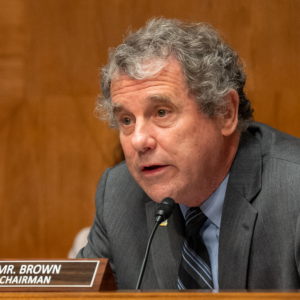As we approach the first anniversary of Silicon Valley Bank’s collapse, lawmakers should refrain from enhancing the power of the executive branch at the expense of the American people.
Sen. Sherrod Brown’s Recovering Executive Compensation Obtained from Unaccountable Practices Act of 2023 (RECOUP Act) is a textbook example of legislation that will do nothing to address bank failures but will drastically expand the federal government’s power.
Brown’s bill grants the Federal Deposit Insurance Corp. (FDIC), Federal Reserve, and Office of the Comptroller of the Currency (OCC) the authority to claw back bank executive compensation. Yet, the bill fails to specify any legal threshold of culpability — leaving regulators with free rein to unilaterally make decisions regarding bank boards. Regulators have statutory authority to limit bank executive compensation. The need for more unbridled authority is unwarranted.
The worst provision of the bill gives regulators nearly unlimited authority to remove bank executives from their positions. Section 2 of the bill allows the FDIC, Fed, and OCC to remove bank executives from their positions if they fail “to carry out the responsibilities of the senior executive for governance, operations, or risk or financial management of an insured depository institution or business institution.”
Federal regulators are given full discretion to remove bank executives without any limiting legal standard if a bank executive fails “to appropriately implement financial, risk, or supervisory reporting or information system or controls” or fails to “oversee” the supervisory reporting, information system or controls. These new removal provisions apply to all banks — including small community banks and banks that are solvent and not at risk of failing.
The broad language of the removal provisions leaves the door open for an expansive reading of regulatory authority. As written, “risk” reporting could encompass environmental, social and governance (ESG) risks, giving the federal government the authority to go after and remove bank executives for failing to oversee criteria such as “climate risk” and other progressive priorities. All without any legal standard of culpability.
The removal provision is broad and gives regulators an authority they already maintain. Federal financial regulators can remove a bank executive if the individual breaches their fiduciary duty and “demonstrates willful or continuing disregard” for the “safety or soundness” of the bank, among other requirements. Regulators have explicit authority to remove executives for violating their duties under a clear legal standard. There is no justification for further expanding regulators’ authority.
The RECOUP Act will not address the problems that led to SVB’s collapse.
While Democrats have tried to blame the bank’s collapse on deregulation, the real downfall was the Fed’s inability to enforce regulations already on the books. For 10 years, the Government Accountability Office and the Fed’s Office of the Inspector General have highlighted federal financial regulators’ reluctance to elevate supervisory actions to mitigate risk before bank failures. Calls for additional regulation become meaningless when the onerous regulations are not being enforced.
Rather than needlessly expanding government authority over banking, we should pursue free-market reforms that will substantively mitigate the risk of future bank failures. Further deregulating non-brokered reciprocal deposits is one reform that lawmakers should consider.
Up to a point, the Economic Growth, Regulatory Relief, and Consumer Protection Act removed non-brokered reciprocal deposits from the definition of a “brokered deposit” to provide banks with flexibility in managing their liquidity and funding needs while also providing depositors with a free-market alternative to stay under the $250,000 deposit insurance limit. Legislation allowing banks to hold more non-brokered reciprocal deposits will provide additional financial security to household and business depositors while mitigating moral hazard concerns.
Legislators should not expand the power of the federal government. Instead, lawmakers need to prioritize free-market reforms that will protect depositors and strengthen the banking sector. The RECOUP Act will do neither.



